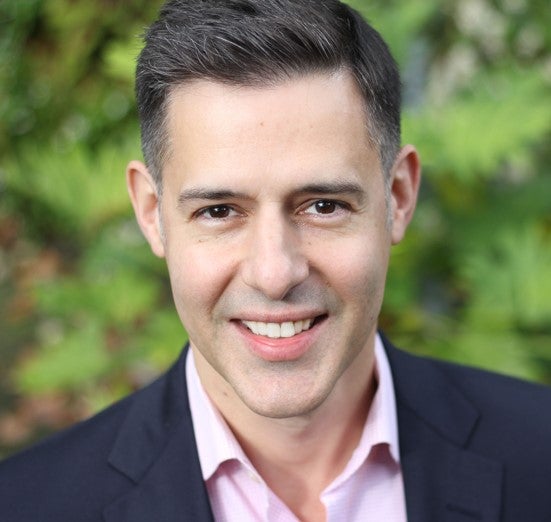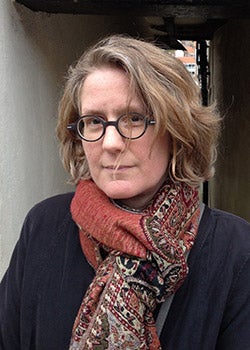The
Brian
Rudrick
Visiting
Scholar
in
Philosophy
is
made
possible
by
a
generous
gift
from
the
estate
of
Dr.
Brian
F.
Rudrick.
Shortly
before
his
untimely
death,
the
Department
of
Philosophy
named
Dr.
Rudrick
an
official
“friend
of
the
department”
because
of
his
inspiring
example
of
lifelong
learning
and
for
demonstrating
for
our
students
how
one
can
make
a
philosophical
contribution
to
professional
and
public
life,
whatever
career
one
chooses.
The
Visiting
Scholar
is an
established
scholar
producing
philosophical
research
at
the
cutting
edge
of
the
discipline.
The
scholar's
visit
includes
an
intensive
schedule
of
seminars,
talks,
and
meetings
that
will
facilitate
learning
opportunities
for
students,
encourage
network-building
opportunities
for
researchers,
and
provide
outreach
to
the
larger
community.
Our next Rudrick Scholar is coming soon
We've had the pleasure of hosting:
 Kyle
Whyte
(2019)
Kyle
Whyte
(2019)

Dr. Kyle Whyte is a professor, Timnick chair, and environmental activist at Michigan State University. His research addresses moral and political issues concerning climate policy and Indigenous peoples, the ethics of cooperative relationships between Indigenous peoples and science organizations, and problems of Indigenous justice in public and academic discussions of food sovereignty, environmental justice, and the anthropocene. He is an enrolled member of the Citizen Potawatomi Nation. Kyle has partnered with numerous Tribes, First Nations and inter-Indigenous organizations in the Great Lakes region and beyond on climate change planning, education and policy. He is involved in projects and organizations that advance Indigenous research methodologies, including the Climate and Traditional Knowledges Workgroup, Sustainable Development Institute of the College of Menominee Nation, Tribal Climate Camp, and Ngā Pae o te Māramatanga. He has served as an author on reports by the U.S. Global Change Research Program and is former member of the U.S. Federal Advisory Committee on Climate Change and Natural Resource Science and the Michigan Environmental Justice Work Group. Kyle's work has received the Bunyan Bryant Award for Academic Excellence from Detroiters Working for Environmental Justice, MSU's Distinguished Partnership and Engaged Scholarship awards, and grants from the National Science Foundation.
Public lectures:
- "Not Done Critiquing Wilderness Areas, National Parks & Public Lands"
- "Is Indigenous Research Possible Within the Confines of Anglophone Philosophy Departments?"
 John
Corvino
(2019)
John
Corvino
(2019)

Dr. John Corvino, is Dean of the Irvin D. Reid Honors College and Professor of Philosophy at Wayne State University.
His research mainly focuses on controversial "culture war" issues surrounding sexuality and marriage. He is the author or co-author of three books from Oxford University Press: Debating Same-Sex Marriage (with Maggie Gallagher), What’s Wrong with Homosexuality?, and, most recently, Debating Religious Liberty and Discrimination, with Ryan T. Anderson and Sherif Girgis.
In addition to his books and scholarly articles, Dr. Corvino has contributed to The New York Times, the Los Angeles Times, the Detroit Free Press, the Huffington Post, The New Republic, Slate, Commonweal, and other popular venues. He is the recipient of several teaching awards, including the Wayne State University President’s Award for Excellence in Teaching and a 2012 Distinguished Professor of the Year Award from the Presidents Council of the State Universities of Michigan. In the last 25 years, he has spoken at over 250 campuses on issues of sexuality, ethics, and marriage. His online videos have received over two million views.
Public lectures:
- "Masterpiece Cakeshop, Sexual-Orientation Discrimination, and the Metaphysics of Cakes"
- "On the Rhetoric of Bigotry
 Eva
Kittay
(2017)
Eva
Kittay
(2017)

Dr. Eva Kittay is a Distinguished Professor of Philosophy at Stony Brook University and an Affiliate of the Stony Brook Women’s Studies Program. With more than 85 articles and seven books and edited volumes under her belt, it would be an understatement to call her a prolific scholar. Kittay and coauthor Licia Carlson published Cognitive Disability and Its Challenge to Moral Philosophy in 2010. She published The Subject of Care: Feminist Perspectives on Dependency with coauthor Ellen Feder in 2003, and her book Love’s Labor: Essays on Women, Equality and Dependency was a major event in the world of philosophy when it hit the presses in 1999.
Dr. Kittay is an activist as well as a scholar. She has worked long and hard at making the discipline of philosophy more inclusive, and at using philosophy to engage in contemporary social issues. She was a founding member and is currently the chair of Philosophy in an Inclusive Key, a summer program for undergraduate students who are members of groups underrepresented in philosophy. In 2003, the Society for Women in Philosophy named her Woman Philosopher of the Year. Dr. Kittay has been honoured by a Guggenheim Fellowship, an NEH Fellowship, and the APA and Phi Beta Kappa Lebowitz Prize.
Public lectures:
- "The Desire for Normalcy
- "The Moral Significance of Being Human"
 Jennifer
Saul
(2015)
Jennifer
Saul
(2015)

Dr. Jennifer Saul from the University of Sheffield, is an internationally renowned expert on both the philosophy of language and feminist philosophy. She is the author of Lying, Misleading, and What is Said: An Exploration in Philosophy of Language and in Ethics (2013), Substitution, Simple Sentences and Intuitions (2007), and Feminism: Issues & Arguments (2003), as well as many noted articles.
In 2011, Professor Saul was awarded Distinguished Woman Philosopher by the Society For Women in Philosophy. She is founder and co-blogger of the well-known Feminist Philosophers blog, as well as spin-off blogs What Is It Like to Be a Woman in Philosophy, What We’re Doing About What It’s Like, and This is What a Philosopher Looks Like. She is also the co-architect of the influential Gendered Conference Campaign.
Public lectures:
- “Dogwhistles, Philosophy of Language, and Political Manipulation”
- “Generics Don’t Essentialise People; People Essentialise People"
- “The Pragmatics of Inclusivity”
- “Misleading and Morality”
- “Implicit Bias, Stereotype Threat and Women in Academia”